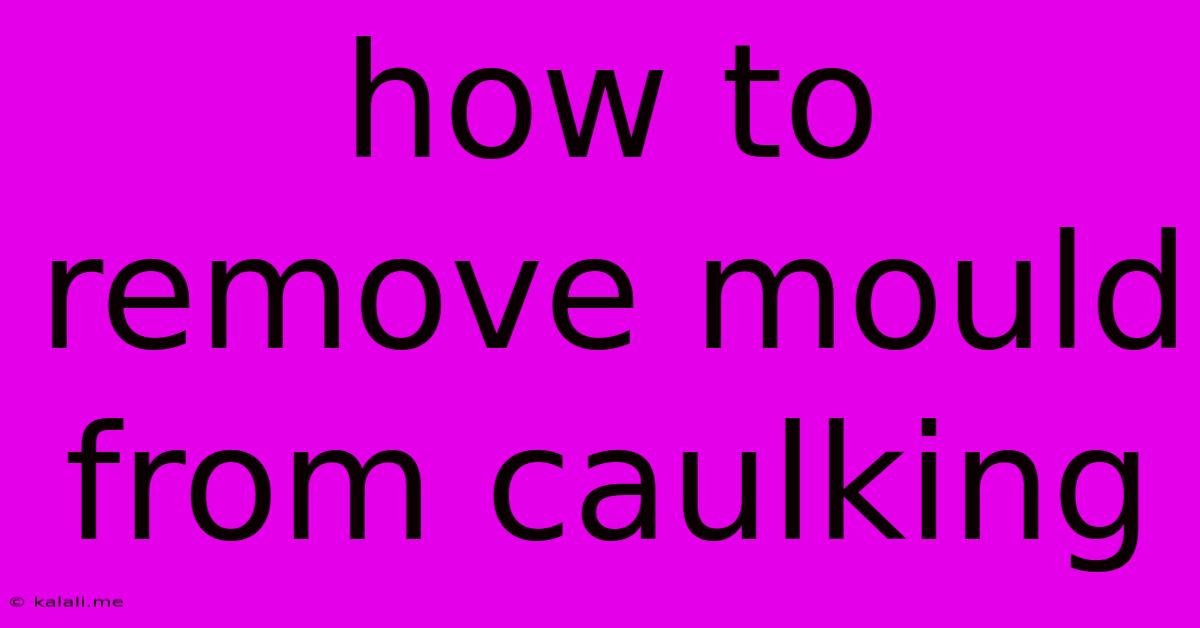How To Remove Mould From Caulking
Kalali
Jun 07, 2025 · 3 min read

Table of Contents
How to Remove Mold from Caulking: A Comprehensive Guide
Mold in caulking is a common household problem, unsightly and potentially harmful to your health. This article provides a step-by-step guide on how to effectively remove mold from caulking, ensuring a clean and healthy home. We'll cover prevention strategies too, so you can keep mold at bay for longer.
What you'll need:
- Safety Gear: Gloves, eye protection, and a dust mask are crucial to protect yourself from mold spores.
- Cleaning Solution: A mixture of bleach and water (1 part bleach to 10 parts water) is effective, but for more sensitive surfaces, consider a solution of white vinegar and water (equal parts). Baking soda paste can also work for minor mold.
- Scrubbing Tool: An old toothbrush, a stiff-bristled brush, or a grout cleaning tool works well.
- Caulk Removal Tool: A utility knife or caulking tool can help remove severely moldy caulk.
- Towels or Rags: To wipe away the cleaning solution and mold.
- New Caulk: If the caulk is severely damaged, you'll need to replace it.
Step-by-Step Guide to Mold Removal:
1. Preparation is Key
Before you begin, ensure proper ventilation in the area. Open windows and doors to allow fresh air to circulate. Put on your safety gear – gloves, eye protection, and a dust mask are essential to prevent inhalation of mold spores.
2. Assess the Mold Infestation
Determine the severity of the mold growth. Minor surface mold can often be cleaned, while extensive or deeply embedded mold may require caulk removal and replacement.
3. Cleaning the Mold
For minor mold: Apply your chosen cleaning solution (bleach/water, vinegar/water, or baking soda paste) to the affected area. Let it sit for 5-10 minutes to allow the solution to penetrate and kill the mold. Then, gently scrub the mold away with your chosen tool. Rinse thoroughly with clean water and dry completely with a towel.
For severe mold: If the mold is extensive or deeply embedded, it's best to remove the affected caulk completely. Use a utility knife or caulking tool to carefully remove the old caulk. Be sure to remove all traces of the old caulk, including any moldy residue.
4. Cleaning the Area After Caulk Removal
After removing the old caulk, thoroughly clean the area with your chosen solution, ensuring all traces of mold and old caulk are removed. Allow the area to dry completely before applying new caulk.
5. Applying New Caulk
Once the area is completely dry, apply a fresh bead of high-quality caulk. Choose a mildew-resistant caulk for longevity. Smooth the caulk with a wet finger or smoothing tool for a professional finish.
6. Post-Cleaning
After cleaning, ensure proper ventilation to allow the area to dry completely. Dispose of used cleaning materials and any removed caulk properly.
Preventing Future Mold Growth:
- Proper Ventilation: Ensure good ventilation in areas prone to moisture, such as bathrooms and kitchens. Use exhaust fans and open windows when possible.
- Regular Cleaning: Regularly clean caulking with a damp cloth and mild detergent to prevent mold buildup.
- Moisture Control: Address any leaks or moisture problems promptly. Repair leaky pipes, windows, and roofs to prevent water damage.
- Mildew-Resistant Caulk: Use high-quality, mildew-resistant caulk to reduce the risk of mold growth.
By following these steps and preventative measures, you can effectively remove mold from caulking and keep your home clean and healthy. Remember, always prioritize safety by wearing protective gear. If you are dealing with a large-scale mold problem or are unsure about tackling the job yourself, consider contacting a professional mold remediation service.
Latest Posts
Latest Posts
-
Where To Put Airtag In Luggage
Jun 07, 2025
-
Consider Using The User Option Or Check The Permissions
Jun 07, 2025
-
Animals With Highest Intelligence In 5e
Jun 07, 2025
-
15 Amp Gfci Breaker Keeps Tripping
Jun 07, 2025
-
How Do I Find Cubic Inches
Jun 07, 2025
Related Post
Thank you for visiting our website which covers about How To Remove Mould From Caulking . We hope the information provided has been useful to you. Feel free to contact us if you have any questions or need further assistance. See you next time and don't miss to bookmark.